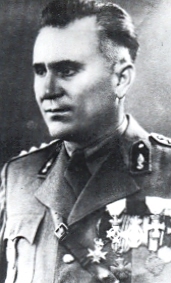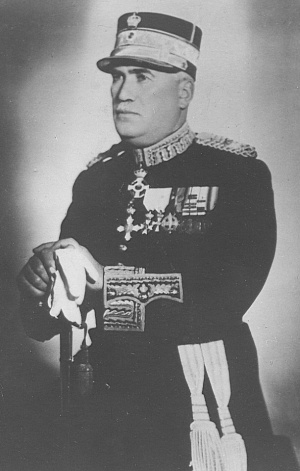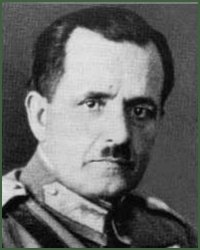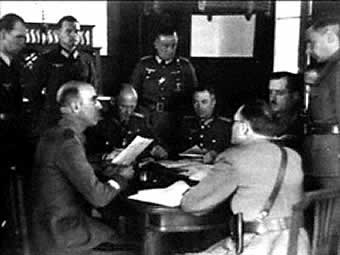<Back to Index>
- Colonel of the Greek Army Konstantinos Davakis (Κωνσταντίνος Δαβάκης), 1897
- Lieutenant General of the Greek Army Georgios Stanotas (Γεώργιος Στανωτάς), 1888
- Lieutenant General of the Greek Army Georgios Tsolakoglou (Γεώργιος Τσολάκογλου), 1886
PAGE SPONSOR

Konstantinos Davakis (Greek: Κωνσταντίνος Δαβάκης) was a Greek military officer in World War II. He organized the Greek defensive lines during the Battle of Pindus that led to Italian defeat in the first stage of the Greco - Italian War of 1940.
He was born in the village of Kechrianika, Laconia prefecture, in 1897. After graduating from military school, he saw action in World War I and the Greco - Turkish War (1919 - 1922).
Davakis was a colonel when Italy attacked Greece on 28 October 1940. As commander of the Pindus detachment (Απόσπασμα Πίνδου), he successfully repelled the Italian Julia Alpine Division's attack in late October 1940 but was seriously injured in November of the same year, when he counter attacked, nearly destroying it.
Davakis' detachment, composed of two infantry battalions of the 51st Infantry Regiment, one cavalry troop and one artillery battery, was the first Greek unit that received the "blow" of the Italian invasion. Davakis' forces were overstretched, covering a 30 km front on mountainous terrain. His unit resisted the Julia Division's advance for two days, by which time sufficient reinforcements could be brought up to contain and defeat the Italians.
On 2 November 1940, near the village of Samarina, while directing his unit, Davakis was hit in the chest, suffering serious lung injury and lapsing into a coma. Although he regained consciousness two days later, he remained hospitalized. In December 1942, he was arrested by the Italian occupation authorities, along with other Greek officers, suspected of participation in the Greek Resistance. The officers were to be shipped to POW camps in Italy on the Citta di Genoa liner, but the ship was torpedoed and sank off southern Albania in January 1943. Davakis' body was recognized by local Greeks and buried at Vlorė. His bones were transferred to Athens after the war.

Georgios Stanotas (Greek: Γεώργιος Στανωτάς, January 1, 1888 - 1965) was a Greek cavalry officer who rose to the rank of Lieutenant General.
He was born in the village of Kastanitsa, in the prefecture of Arcadia in the Peloponnese. He left his village early and went to Athens, where, in 1909, he joined the Hellenic Army as a simple cavalry trooper. He was an excellent rider, intelligent and bold, and soon he was promoted to non commissioned officer. As such he participated in the First and Second Balkan Wars in 1912 - 1913, where he went up the ranks quickly due to his bravery.
In 1914, he entered and graduated from the NCO Academy and was promoted to Second Lieutenant of Cavalry. In 1917 he was promoted to Captain, but as an avowed royalist, so in 1917, after the ousting of King Constantine I during the National Schism, he was suspended from the Army for 6 months.
In the Greco - Turkish War of 1919 - 1922, he demonstrated courage and extremely brave actions and initiative, so he received medals and decorations and became well known. He was promoted to Major in 1923. Although in the military, in 1924 he enrolled into Athens University in the Pharmaceutics department. In 1927 he was promoted to Lieutenant Colonel and was appointed as Cavalry School Commander, while in 1929 he took command of the 3rd Cavalry Regiment in Larissa. In the following year, he was promoted to Colonel and in 1933 he took command of the Cavalry Brigade. He was promoted to Major General in 1938 and was appointed as CO of the Cavalry Division in Thessaloniki in 1939.
In the Greco - Italian War of 1940, the Cavalry Division achieved the first great victory in the Battle of Pindus, being instrumental in the defeat of the elite Italian Julia Alpine Division. In the spring of 1941, Stanotas with the Cavalry Division fought against the invading Germans in West Macedonia, next to the rest of the Allied Forces. His combat achievements gave him a great reputation among his colleagues.
In 1943, he escaped from occupied Greece and through Turkey and Lebanon, he arrived in Cairo, where he joined the Greek Armed Forces in exile. There he was appointed as Inspector General of the Army. He retired in January 1945, after the liberation of Greece.
In 1947, when Greece was in the middle of the Greek Civil War, he was recalled to duty and was appointed as Commanding General of the Peloponnese. His experience allowed him to organize successful sweep operations and to destroy the main strongholds of the Democratic Army of Greece there. He finally retired in 1948 and received the honorary rank of Lieutenant General.
He was married to Aristea Toliopoulou and had a son Stamatios and a daughter Maria. After his retirement, he played a pioneering role in the development of the plastics industry in Greece. He died in 1965.


Georgios Tsolakoglou (Greek: Γεώργιος Τσολάκογλου; April 1886 - 22 May 1948) was a Greek military officer who became the first Prime Minister of the Greek collaborationist government during the Axis Occupation in 1941 - 1942.
As an officer in the Greek Army, he participated in the Balkan Wars, the First World War, the 1919 Allied expedition to the Ukraine and the Asia Minor Campaign. With the rank of Lieutenant General, he led III Army Corps in the Greco - Italian War. After the German invasion and capture of Thessaloniki on 9 April, 1941, the withdrawal of the Greek Army from Northern Epirus was belatedly ordered on 12 April. The German motorized units, however, succeeded in reaching the vital Metsovon Pass on 18 April, overcame local Greek resistance and captured Ioannina on the following day, thereby effectively cutting off the Greek Army.
When the hopelessness of resistance became apparent, Tsolakoglou, along with several other senior generals began considering surrendering to the Germans. Thus, on 20 April, with the cooperation of the commanders of I Corps, Lieutenant General Panagiotis Demestichas, and II Corps, Lieutenant General Georgios Bakos, and the metropolitan of Ioannina, Spyridon, he relieved and replaced Lieutenant General Ioanis Pitsikas, the commander of the Army of Epirus. He immediately sent messengers to the Germans proposing surrender, and on the same day signed a surrender protocol with the commander of the Leibstandarte SS Adolf Hitler brigade, Sepp Dietrich.
Despite urgent orders by Greek Commander - in - Chief Alexandros Papagos, that he be relieved and resistance continued to the last, the next day, at Larissa, the surrender was formalized, with Tsolakolglou signing the unconditional surrender of the Greek Army to the Germans. The protocol made - deliberately - no reference to the other invading Axis partner, Italy, whom the Greeks considered to have defeated and wished to, in the words of John Keegan, "...deny the Italians the satisfaction of a victory they had not earned...". However, at Benito Mussolini's insistence, the surrender ceremony was repeated a third time to include Italian representatives on 23 April.
Tsolakoglou himself wrote in his memoirs: "I found myself before a historic dilemma: To allow the fight to continue and have a holocaust or, obeying the pleas of the Army's commanders, to assume the initiative of surrendering.... Having made my decision to dare, I did not consider responsibilities.... Until today I have not regretted my actions. On the contrary, I feel proud."
On 30 April 1941, Tsolakoglou was appointed Prime Minister of a collaborationist government by the Axis Occupation authorities. Several other generals who had served in the Albanian campaign became members of the Tsolakoglou government, such as Generals Panagiotis Demestichas and Georgios Bakos. Tsolakoglou remained as head of the government until 2 December 1942, when he was dismissed and replaced by Konstantinos Logothetopoulos.
After Greece was liberated, Tsolakoglou was arrested, tried by a Special Collaborators Court in 1945 and sentenced to death. His death penalty was ultimately commuted to life imprisonment, and he died of leukemia in prison in 1948.